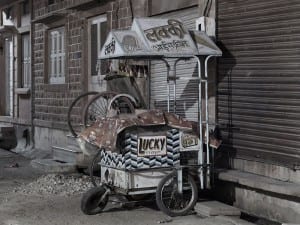Firmly establishing herself in the literary community as a writer to be reckoned with, Sandra Newman is back with her new novel Cake, after her freshman work The Only Good Thing Anyone Has Ever Done, published in 2002, broke into the scene with praises of her deep characterisations and brought her the “First Book Award” from The Guardian.
Cake has quite a different message from her first novel; moving away from the hopeful themes of self-discovery and fate, Newman takes a slightly different track and this time focuses on the “painful truth of life.” This time there is no redemption for the main character, Eleanor, a character whom she says is based on a man from a previous relationship. Most of the inspiration for her characters comes from her personal relationships, people she’s known that have done “extreme things,” and for this Newman says, “There’s a conjunction between personality type and situational experiences that produces the sociopathic type of mind.” The muse for Eleanor was a pathological liar, unable to understand the consequences of his lying even when it was repeatedly explained to him; to this, Newman adds, “Betrayal is the most unforgivable wrong.”
On top of this strong conviction, Newman goes on to explain that, “Often, with criminals we are able to forgive the ones who have unity and attachment to family,” and, “those that betray family are seen as inhuman, separate, and less forgivable.” There’s no surprise then when Newman says that she struggled with the message of Cake; originally she meant to argue a case for forgiveness, but instead puts forth the case that in reality, forgiveness is often impossible. In cases of such betrayal, we must “accept the inevitability that we suffer from the deeds of others,” says Newman.
Despite her strong connection with the characters and praise for her previous book, there was a lot of pressure in publishing Cake. The publishing industry, she notes, is becoming more like film – authors are judged on the last thing they’ve done, whereas their previous works hold little merit with critics. Adding to Newman’s worries is a fear that she has little room left to grow and change in her writing: where she had previously spent hours in free-association writing, painstakingly putting together word after word, she now has a method of “just shutting off and writing.” Whether or not this means she has peaked in her development as a writer will ultimately remain to be seen, but if Cake is any indication of more books to come it doesn’t look as if she’ll suffer for it.
Outside of writing, Sandra has been teaching creative writing at Temple University in Philadelphia, Pennsylvania. The most useful exercise she has found for new writers is reading the work of other writers in the class. Students are able to able to identify mistakes in another’s work, and “while their ego isn’t in the way,” can criticise them, apply that new knowledge to their own work, and correct their mistakes. It’s hard for her to teach writing courses, though, as she says most students don’t have what it takes talent-wise to advance in their chosen careers after graduation, a situation that many teachers find frustrating.
While her books make their way into writing courses, Sandra says the writers she most looks up to are Robert Musil, the Austrian Modernist author, and Michael Bruce, the English war-time author and traveller. Their Modernist leanings are evident in her work, but other than that it becomes apparent that Sandra’s work is definitely, originally, and identifiably hers. As for contemporaries, she took interest in Ben Marcus and Anna Parson, but “with age, contemporaries become less exciting,” and she often relates more to past authors.
As for now, Sandra says she has finished teaching, and after talking to her publicist she has decided to write a memoir. She has also just finished work on How Not to Write A Novel, a satirical look at novel writing, which she co-wrote. It is set to appear from HarperCollins in 2008. With that busy writing schedule, it would seem that Sandra wouldn’t mind living in one place for a while – instead she feels “trapped” with her current situation of living in New York City for the past three years, as her husband’s career is based there. Sandra’s travelling background includes 20 years in England, with a few years here and there in Germany and Malaysia.
Stephanie Everett





